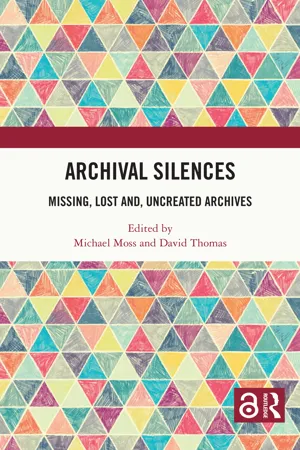
Archival Silences
Missing, Lost and, Uncreated Archives
- 258 pages
- English
- ePUB (mobile friendly)
- Available on iOS & Android
Archival Silences
Missing, Lost and, Uncreated Archives
About this book
Archival Silences demonstrates emphatically that archival absences exist all over the globe. The book questions whether benign 'silence' is an appropriate label for the variety of destructions, concealment and absences that can be identified within archival collections.
Including contributions from archivists and scholars working around the world, this truly international collection examines archives in Australia, Brazil, Denmark, England, India, Iceland, Jamaica, Malawi, The Philippines, Scotland, Turkey and the United States. Making a clear link between autocratic regimes and the failure to record often horrendous crimes against humanity, the volume demonstrates that the failure of governments to create records, or to allow access to records, appears to be universal. Arguing that this helps to establish a hegemonic narrative that excludes the 'other', this book showcases the actions historians and archivists have taken to ensure that gaps in archives are filled. Yet the book also claims that silences in archives are inevitable and argues not only that recordkeeping should be mandated by international courts and bodies, but that we need to develop other ways of reading archives broadly conceived to compensate for absences.
Archival Silences addresses fundamental issues of access to the written record around the world. It is directed at those with a concern for social justice, particularly scholars and students of archival studies, history, sociology, international relations, international law, business administration and information science.
Frequently asked questions
- Essential is ideal for learners and professionals who enjoy exploring a wide range of subjects. Access the Essential Library with 800,000+ trusted titles and best-sellers across business, personal growth, and the humanities. Includes unlimited reading time and Standard Read Aloud voice.
- Complete: Perfect for advanced learners and researchers needing full, unrestricted access. Unlock 1.4M+ books across hundreds of subjects, including academic and specialized titles. The Complete Plan also includes advanced features like Premium Read Aloud and Research Assistant.
Please note we cannot support devices running on iOS 13 and Android 7 or earlier. Learn more about using the app.
Information
1
Theorising the silences
Silences only exist when researchers in the archives notice them
Absence of evidence is not evidence of absence
Table of contents
- Cover
- Half Title
- Title Page
- Copyright Page
- Dedication
- Table of Contents
- List of figures
- List of tables
- Notes on contributors
- Introduction
- Chapter 1: Theorising the silences
- Chapter 2: What are silences?: The Australian example
- Chapter 3: Silent contemporary records: Access to the archive of the Special Investigation Commission in Iceland, 2010–2019
- Chapter 4: Noises in the archives: Acknowledging the present yet silenced presence in Caribbean archival memory
- Chapter 5: Silenced and unsilenced memories: Archival fonds of Brazil’s political police, 1964–1985
- Chapter 6: Uncovering archival silences through photographs and listening: Envisioning archives as a democratic space
- Chapter 7: Silences in Malawi’s archives
- Chapter 8: Perceived silence in the Turkish archives: From the Ottoman Empire to modern republic
- Chapter 9: Silenced archives and archived voices: Archival resources for a history of post-independence India
- Chapter 10: The voices of children and adolescents in the archives
- Chapter 11: Diaries and silence
- Chapter 12: Filling the gaps
- Afterword: Tales from the sometimes ‘silent’ archives
- Index